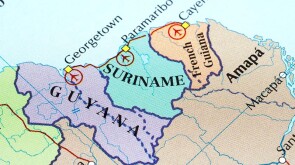JPT March 2023 Issue

On the Cover
The number of petroleum engineering graduates will drop again next year, and it has not bottomed out yet. Source: Getty Images.
Read the JPT Digital Magazine.
[Members only]
Monthly Features
-
The trend in falling petroleum engineering graduation rates is good for job seekers.
-
From refracturing old wells to ones that don’t have to be fractured at all, notable producers argue that experiments are paying off.
-
Geothermal energy is bidding to emerge from its dark horse status in Texas and become a possible solution of choice for some renewable applications.
-
Federal infrastructure law gives states financial incentive to remediate orphan wells.
Guest Editorial
-
Whether buying or selling, quality, non-production data can help operators achieve improved margins and less downtime, unlocking the true potential of their wells.
President's Column
-
The SPE Strategic Plan has been updated, and the changes to SPE’s bylaws have been finalized.
Comments
-
Dealmaking has picked up steam, especially by Oxy. Many of the announced deals by Oxy and others are in Texas and in the Gulf Coast region.
Case Study
-
Results from more than 50,000 runs where shaped cutters resolved drilling issues demonstrate that, by matching the combination of cutters to the formation and the downhole conditions, it is possible to improve ROP, extend bit life, and drill longer runs for more cost-efficient operations.
Case Study
-
Over 1,000 hours of remotely monitored continuous production was achieved on an unmanned platform—a first for standalone offshore solids management in the North Sea.
SPE News
-
After 21 years with SPE and more than 40 years in the energy industry, Glenda Smith announced her retirement.
E&P Notes
People
-
This section lists with regret SPE members who recently passed away.
SPE Technical Papers Available
-
SPE technical papers synopsized in each monthly issue of JPT are available for free download for SPE members for 2 months. These February and March papers are available now.
Artificial Lift
-
In selecting papers for this edition, the criteria of conformance to guidelines and novelty of information, technical equipment, and application were considered. Industry indicators and interest were also factors.
Production Monitoring
-
New sensors and innovative uses of existing technology are allowing access to a variety of data that can be incorporated into integrated work flows and modeling tools for better understanding of the production system. There are initial signs of operations moving toward the use of real-time models.
High Pressure/High Temperature
-
The array of papers received for review this year covers a wide spectrum, both in applications and research, which indicates that the exploration and production industry is actively working to monetize high-pressure/high-temperature reservoirs.
Formation Damage
-
While the ongoing technical studies and technology developments in the area of formation damage are heavily focused on key damage-mechanism scenarios during drilling and production, such as drilling-fluid-induced damage, scaling, clay swelling, fines migration, and incompatibility of fluid/fluid and fluid/rock in conventional sandstone and carbonate reservoirs, there …
SPE Members: Access the free technical papers synopsized above through 30 April 2023. A PDF of the issue is also available for download.























